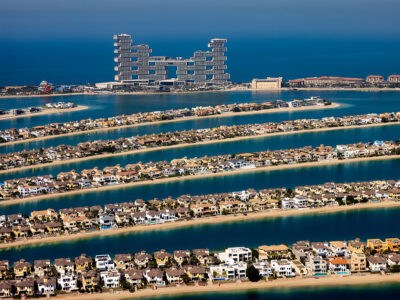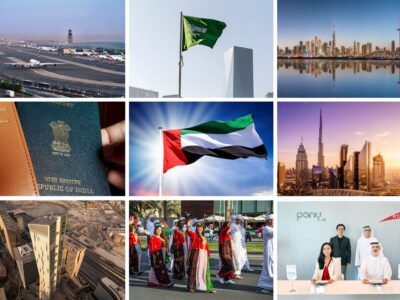One thing is for certain as the countdown starts in earnest for the 2022 FIFA World Cup in Qatar. This year’s global soccer spectacle will be unlike any other.
For the first time in the quadrennial tournament’s 92-year history, it will be staged in November and December instead of the mid-year months.
The FIFA World Cup Qatar is perhaps the world’s biggest sporting event, with the mega-tournament set to help raise Qatar’s global profile. as strong government support and growing commercial maturity are helping to raise the Gulf’s profile in the sporting world.
The 2022 FIFA World Cup will attract an estimated 1.5 million visitors to Qatar during the four-week celebration, continuing the sport’s longstanding tradition of being one of the most popular worldwide sporting competitions.
Qatar has invested hundreds of billions of dollars in developing infrastructure and building stadiums to host the event. One key organiser estimated that the event could spur a $20 billion boost to the economy.
As the date for the FIFA World Cup Qatar nears, the country has issued two new announcements impacting travel and education:
- Qatar to close borders ahead of FIFA World Cup 2022
- Qatar to close schools during FIFA World Cup 2022
Qatar to close borders ahead of FIFA World Cup 2022
Qatar is to shut its borders to anyone not attending the FIFA World Cup, between November 1 and December 23.
All land, sea and air borders will effectively to be shut to anyone not holding the Hayya Card – the fan ID issued by the government to anyone attending matches during the World Cup.
The event begins on November 20 and ends of December 18, and Hayya Card holders can stay in the country until January 23.

The closure will not affect Qatari citizens, residents, GCC citizens holding a Qatari ID card, and anyone with a personal or work visa.
But it means anyone planning to visit the country for tourism purposes not related to the World Cup will not be able to enter.
FIFA has sold 2.45 million of the three million tickets available, with thousands of fans expected to start arriving from mid-November.
The World Cup’s first match on November 20 will feature the hosts Qatar taking on Ecuador, while England play Iran the following day.
Although borders will be closed to non-soccer fans, hundreds of thousands of visitors are expected in nearby cities such as Dubai, which is building fanzones to accommodate them.
Qatar to close schools during FIFA World Cup
Schools in Qatar are to close during the FIFA World Cup, as the country finalises preparations for the mega event starting in November.
According to ministerial circulars already issued by the Ministry of Education, the current first term – which began on August 14 – will end on Friday 18 November, after which the vacation period will begin.
The World Cup begins two days later in Doha – and ends of December 18. Schools will return on December 25 for the start of the second term.

No online schooling will be undertaken during this period, with the new schedule helping easing the burden on transportation and other key infrastructure facilities during the World Cup.
Earlier today, Arabian Business reported Qatar is to shut its borders to anyone not attending the World Cup, between November 1 and December 23.
All land, sea and air borders will effectively to be shut to anyone not holding the Hayya Card – the fan ID issued by the government to anyone attending matches during the World Cup. Hayya Card holders can stay in the country until January 23.
Qatari citizens, residents, GCC citizens holding a Qatari ID card, and anyone with a personal or work visa are exempt from these rules, but it does mean that anyone planning on visiting the country for tourism purposes without a Hayya Card will not be able to enter.
FIFA has sold 2.45 million of the three million tickets available, with thousands of fans expected to start arriving from mid-November.
The World Cup’s first match on November 20 will feature the hosts Qatar taking on Ecuador, while England play Iran the following day.
Although borders will be closed to non-soccer fans, hundreds of thousands of visitors are expected in nearby cities such as Dubai, which is building fanzones to accommodate them.
Positive impact on real estate:
- FIFA World Cup Qatar’s positive impact on real estate
- Qatar’s real estate market reflects opportunities and promising growth: Report
FIFA World Cup Qatar’s positive impact on real estate
Being on the forefront of one of the world’s most popular sporting events, investors and first-time buyers are now more confident in investing in the market
Qatar faces a demand shift as a result of the country’s imminent hosting of the 2022 FIFA World Cup. Doha recorded an uplift of 23 percent in average rental unit pricing and Al Khor witnessed a 38 percent price rise over the same period, the Property Finder report shows.
According to the report, price hikes are expected to be temporary, and forecasts a slight decrease in demand next year. Currently, demand for apartments – particularly short-term and serviced units continues to rise.
Occupancy of residential units has been reported at 80 percent, mainly due to demand for leases by the Supreme Committee for Delivery and Legacy for the 2022 FIFA World Cup, as well as companies looking for staff accommodation. Ministry of Justice’s Quarterly Real Estate Bulletin reported 1251 real estate sale transactions in the first quarter, amounting to QAR4.85 billion.

“With Qatar being on the forefront of one of the world’s most popular sporting events, investors and first-time buyers are now more confident in investing in the market. The Ministry of Justice is also taking the necessary steps in creating a more transparent market, which will open the doors for even more investment in the near future,” states the report.
Sales demands are attributed to Qatar’s new foreign property ownership, and to investments laws and their inherent advantages as well as an increase in the areas that foreigners are now allowed to invest in, according to Property Finder.
Qatar’s real estate market reflects opportunities and promising growth: Report
The report by Investment Promotion Agency Qatar (IPA Qatar) and EY identifies the country’s legislative, reforms, significant investments in infrastructure and positive economic outlook as key drivers to unlock further business opportunities. It also highlights sector developments and investment opportunities across commercial, residential and retail real estate.
A substantial growth of 6.9 percent in supply between 2010-2020 was noted. Additionally, residential demand, backed by various factors like the enactment of real estate sector laws for foreign investors, the country’s hosting of mega-events and the growing expatriate population, are poised to maintain an upward trend, according to the report.
Commercially, the office sector is set to face growth, as the economic activity picks up, while various regulatory and fiscal incentives by the Ministry of Commerce and Industry, Qatar Free Zones Authority and Qatar Science and Technology Park, will continue to stimulate the sector’s growth prospects, the report details.

Retail real estate is projected to continue attracting demand, especially for destination and entertainment-focused retail developments, mainly attributed to the country’s upcoming mega events, namely, World Cup (2022), Formula 1 (10-year deal starting 2023), FINA world championships (2023) and Asian games (2030).
Qatar has made significant strides in fostering an eco-friendly real estate sector and introducing innovative concepts to reduce its carbon footprint.
The potential of the market has been further expanded following the investment in construction projects worth $250 billion and the Council of Ministers’ Decision No. (28) of 2020 on the conditions, controls, benefits, and procedures for ownership and use of real estate in the country, the report explains.
Some of the benefits granted to real estate investors are permanent residency, which provides benefits such as free health care, education/tuition, and the ability to invest in certain commercial activities.
In September 2022, the Government of Qatar approved the establishment of the Real Estate Regulatory Authority which will be responsible for preparing a national plan for organising and stimulating the real estate sector. Such government policies have been enacted to grow and strengthen Qatar’s economic development and develop the real estate sector.








